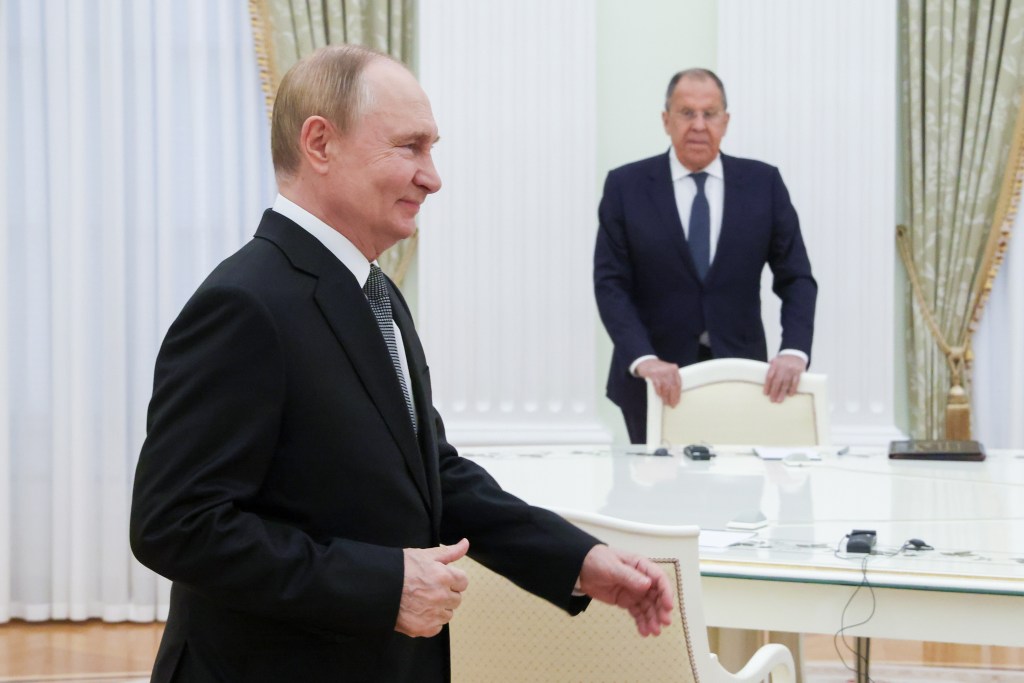🔴 Website 👉 https://u-s-news.com/
Telegram 👉 https://t.me/usnewscom_channel
President Donald Trump wants to stop the killing in Ukraine, but Russia’s foot-dragging is making it abundantly clear that he’ll need to apply far more pressure before any serious negotiations can begin.
To do so, Trump will have to squeeze Russia’s primary source of income, its oil revenues — without upending the global energy market in the process.
In an interview that aired Sunday, Russian Foreign Minister Sergei Lavrov rejected US-backed security guarantees for Ukraine and balked at Trump’s push for direct talks between Russian President Vladimir Putin and Ukrainian President Volodymyr Zelensky.
Putin insists that Ukrainian forces withdraw from the Kyiv-controlled parts of the country’s eastern Donbas region — an idea Ukraine has rightly dismissed as a non-starter — and demands a host of other concessions aimed at making what’s left of Ukraine a vassal state.
So long as Putin conditions the war’s end on maximalist terms, fighting will continue.
But thanks in part to his efforts to make America “energy dominant,” Trump has options to push Moscow to compromise.
The simplest, most impactful move would be to threaten a new sanctions regime against any company or bank involved in the purchase of Russian oil.
If done right, Trump could bolster America’s negotiating leverage without spiking oil prices.
State-run oil refiners in both India and China have so far flouted Trump’s tariffs, but those firms would run scared from US financial sanctions, which would render those companies — and the banks processing their transactions — toxic to the global financial system.
As part of a new energy sanctions framework, the Treasury Department could allow Chinese and Indian firms to continue importing Russian crude only if they gradually reduce those purchases — and then deposit the money owed Russia in escrow accounts in Beijing and New Delhi.
This would sever Moscow’s access to much-needed revenue without suddenly cutting off global access to the barrels themselves, keeping the oil market stable.
Such a move would simultaneously facilitate the purchase of more American energy, as Trump continues his multi-dimensional trade talks with India, China and others.
And it would give Trump huge leverage over Moscow — with Treasury maintaining the flexibility to open and close escrow account access based on Russian conduct and concessions.
This isn’t Trump’s only option, however.
Alternatively, he could improve the price-cap system Washington and its allies established in 2022.
This mechanism, which remains in place, caps the price that buyers can pay for seaborne exports of Russian crude and petroleum products if those exports involve Western shipping or financial services.
The goal was to restrict Kremlin revenue while keeping Russian oil flowing to the market — but the Western coalition initially set the price cap on Russian crude too high, at $60 per barrel, and didn’t force major purchasers like China and India to comply.
Russia adapted by using non-Western services, including a “shadow fleet” of tankers, to export its oil and circumvent the cap.
Last month, the European Union and United Kingdom lowered the price cap on Russian crude to $47.60 per barrel, and Trump now could push for an even lower ceiling, closer to Russia’s average cost of production, while threatening financial sanctions against any foreign company or bank that end-runs the limit.
At the same time, he could launch a comprehensive crackdown on Russia’s shadow fleet to force a larger share of Russian oil exports to rely on Western services subject to the cap.
Some of Trump’s aides fear that imposing further economic penalties on Russia would doom any chance at diplomacy. But recent history suggests otherwise.
The Alaska summit came only after Trump made repeated threats to punish Russia economically, culminating in his tariffs on India.
That pressure apparently helped motivate Putin to soften his (albeit still wildly unrealistic) territorial demands.
Although additional sanctions may not deal Moscow an immediate knockout blow, they would exacerbate Russia’s economic woes and put Trump in the driver’s seat for future talks.
Washington should then combine that economic pressure with stronger military support for Ukraine, including by sending Kyiv European-financed missiles with sufficient range to strike key military-industrial sites deep inside Russia — and permitting Ukrainian forces to actually use them on Russian territory.
Putin will never abandon his decades-long obsession with dominating Ukraine.
But intensifying economic turmoil, coupled with a realization that Ukraine’s resistance will not break, might eventually convince him to pause the war on terms Kyiv can live with.
“Negotiations are a euphemism for capitulation if the shadow of power is not cast across the bargaining table,” as the late Secretary of State George Shultz observed.
President Trump, the negotiator-in-chief, understands that well.
Richard Goldberg is a senior advisor at the Foundation for Defense of Democracies, where John Hardie is Russia Program deputy director.
